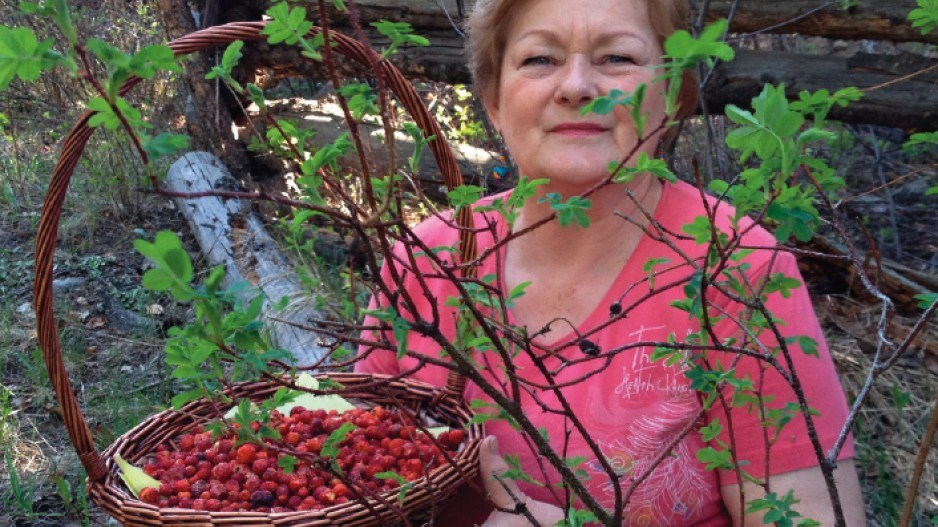Sometimes a business opportunity gets its start as something that looks like nothing more than a nuisance.
Just ask Pat Corbett, who complained to his wife in 1997 that the ubiquitous wild roses on their 20,000-acre South Cariboo Hills Health Ranch were crowding out grazing grass for their horses. Seventeen years later, that "weed" has blossomed into a thriving wellness products business that has spread as far as South Korea and Japan.
While the couple had the germ of the business during their stroll along their ranch fence, it would be several years before Juanita Corbett would be ready to launch her enterprise of exporting rose hip oil to the Far East, among other destinations.
Corbett, who is a certified esthetician, spent three years studying rose hips. Her efforts cost thousands of dollars and involved scientists at the National Research Council, the University of Northern BC and the agricultural labs at Portage La Prairie in Manitoba. What she found is that the red-orange fruit of the rose plant is one of the highest sources of Vitamin C. It also is particularly effective in repairing and healing damaged skin.
It was while attending a women's conference in Burnaby that she was overwhelmed by Asian representatives wanting to import her wellness product. She was soon sold on the notion of expanding what had become a highly successful North American business to Asia.
For those contemplating doing business in the Far East, she has some simple advice: do your research and then do some more research.
"I highly recommend that you do your homework and try to understand what the government requirements are," said Corbett. "Each country is different and we went through a lot of approvals."
Far from resenting the presence of red tape, Corbett says it also serves to protect Canadian firms from an unusual risk: product liability. "If they simply open the door and invite you in, someone is going to counterfeit [your product]. Your name will be on the label, but they put something else in the bottle. They then act like they are selling Canadian rose hip oil."
Corbett says she received a lot of assistance through the approval process from her South Korean distributor, to whom she ships most of her product. She also relies on her distributor to handle issues such as the where and how of product distribution, which she leaves entirely to him.
Kate Ross LeBlanc has similar advice for those considering going her company's route of sourcing its product packaging in Asia. Every year, the Burnaby-based Saje Natural Wellness, which she co-founded in 1992 with husband Jean-Pierre, buys thousands of dollars worth of bottles, printed boxes, caps and misters from factories in Asia.
"Almost everything you are purchasing in North America [for packaging] comes from Asia, so it's just a question of whether you are buying from someone who is buying from someone or whether you are going direct to the source," said Ross LeBlanc in an interview from Bangkok.
For her, going to the source meant having greater control over what she received and the opportunity to customize her packaging, an important feature of the wellness trade. She advises anyone sourcing manufacturing in Asia to understand what the company has to offer.
"You want to know what is it that their factory actually does versus what it is that they outsource," said Ross LeBlanc. "Many factories in Asia tend to represent themselves as a one-stop shop. They might say they manufacture plastic molded bottles as well as glass bottles when in fact they are primarily a plastic factory. I really like to know what I call their 'sweet spot': what it is that they are really good at doing and where they control all the processes [involved in what they manufacture]."
Ross LeBlanc said she also needs to know what a manufacturer doesn't do. "When things go wrong, it's generally because I have believed they can do something when they can't."
She is also a great believer in doing business face-to-face, including frequently using the video advantages of Skype, keeping track of holidays, birthdays and other events, as well as taking a meal with them.
"There is no replacement for actually sitting down with someone and having lunch with them or having tea with them," she said.
One trait she says distinguishes Asian suppliers from their North American counterparts is their commitment to accommodate.
"I remember one supplier who wasn't able to find a way to get a sample to me on time," she said. "He ended up hopping on to a flight from the Far East and bringing it to Vancouver himself." •




